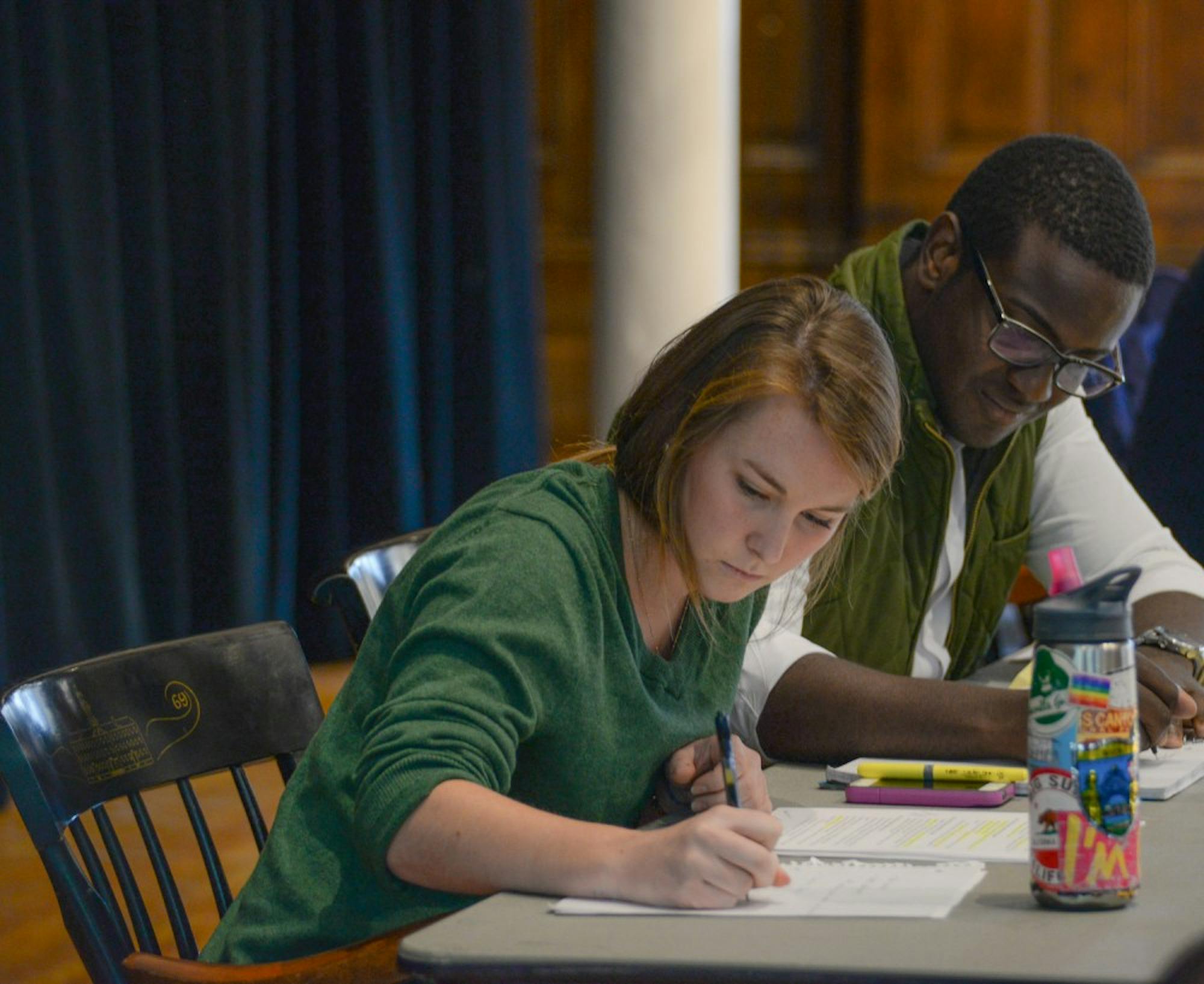Lower voter turnout, fewer candidates, student apathy and an active social media presence, particularly on the app Yik Yak, were distinctive features of this year’s Student Assembly and Class Council elections, students and student representatives observed.
Of the 4,501 eligible students, only 1,632 voted this year, marking a 31 percent-decline from last year when 2,376 students voted, election planning and advising committee chair Derek Whang ’17 said. This year’s turnout is the lowest percentage-wise in the past 10 years, with only 36.2 percent of the eligible students casting a ballot. The second-lowest voter turnout occurred in the 2011 Student Assembly elections, when only 39 percent of the eligible students voted.
Last year’s presidential election featured a field of five candidates, as compared to this year’s two. The vice presidential election, meanwhile, saw three competitors bidding for the position last year.
Newly-elected Student Assembly president Frank Cunningham ’16 said he attributed the lower voter turnout to several factors, including the dreary weather and potential lack of awareness of the election.
He said the weather in particular forced him and newly-elected Student Assembly vice president Julia Dressel ’17 to bring their campaigning indoors. He noted that with last year’s election, it was difficult to not be aware of the election, citing the significant chalking around campus.
“Last year [Dennis] and I campaigned outside of Collis all day,” he said. “You couldn’t look anywhere and not see that it was election day.”
Both he and Dressel also cited recent campus events, including the institution of the hard alcohol ban and the derecognition of Alpha Delta fraternity, of which Cunningham was a member, as causing a sense of apathy and powerlessness among students on campus.
“With a lot of recent changes, students have been feeling like there is nothing students can do, that there is nothing Student Assembly can do and that the administration has all the power in the future,” she said.
She added that the student sense of apathy and hopelessness is a goal both she and Cunningham are actively trying to fight and reverse.
Cunningham also said that student apathy is a theme that has accompanied Student Assembly elections in the past, and said that this is “nothing new.”
“This is just the thing you have to deal with being in Student Assembly — students always want to think that SA can’t do much, but we do do a lot,” he said, citing the mental health campaign. “I think it comes down to getting the message out, and that’s something I think [Dressel] and I did well with the campaign.”
Cunningham added that despite the lower turnout, his and Dressel’s political legitimacy with the student body will not be affected.
“I definitely think that we won by large enough margin to still see a mandate given to us by the student body,” he said. “With that we will take that and run with it. “
The pair also observed the role that Yik Yak, an app that allows posters to anonymously send messages to a public feed in their geographic area, played in the election. On election day several of the top posts were critical of both Cunningham’s and Jake Gaba’s ’16 candidacies.
Cunningham noted that other social media played a significant role, both positive and negative, in their campaign, citing an active Facebook and Instagram presence as well.
2018 Class Council representative Aaron Cheese ’18 said he also noticed a negative vibe on Yik Yak and said he wished that there was a healthier forum for “discourse” among the student body.
He also speculated that the incident last fall over the Student Assembly Patagonia fleeces contributed to negativity on campus toward the campaign, despite what he cited as Dennis’ and Cunningham’s attempts to make amends with the student body in the aftermath of the sanctions from the Undergraduate Finance Committee.
“The way I feel about it is that there has been a lot of bad press associated with the student body president campaign,” he said.
2017 Class Council president Elisabeth Schricker ’17 said she thought that a lack of perceived power or usefulness, particularly with class council, contributed to a lower turnout among students.
“I think there is a lot of untapped potential in Class Council, and because of that students aren’t as interested in voting,” she said.
She also noted that she and her vice president Andrew GoldFarb ’17 will attempt to make the most of the opportunities that are presented to them on Class Council.
Goldfarb ran as a write-in candidate and won the election with 32 votes, according to the official results.
Several students interviewed said that they did not fully understand the role or responsibilities of Student Assembly.
“I know nothing about this, but that’s a good indicator of how much the student body knows about what their own Student Assembly does,” Peter Burgess ’18 said. “Either the student body doesn’t care or there’s not enough transparency between the Student Assembly and the student body. Either one. I’m not sure.”
Roughly half of the students interviewed said they were not surprised that Cunningham won Student Assembly president, and said they believed he was the more qualified of the two candidates.
Several other students reported not voting because they did not support any of the candidates. A group of students in the Class of 2016 said that the felt that the candidates had “no real power” to make changes, so they did not vote in the election.
Estaphanie Aquino, Kelsey Flower and Parker Richards contributed reporting.




